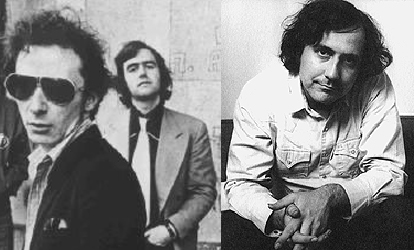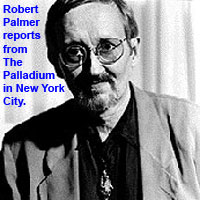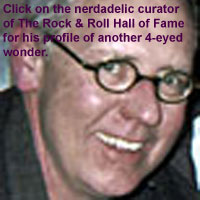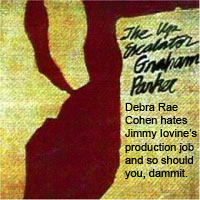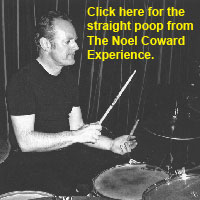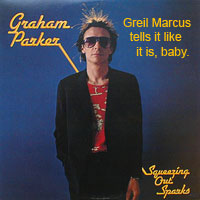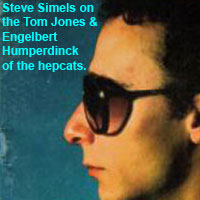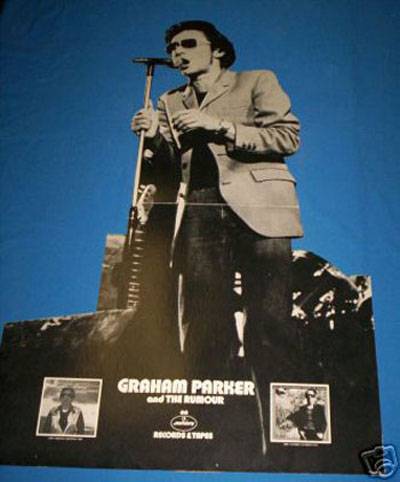
TITLE: Anger Gone, Graham Parker Is Back
AUTHOR: Robert Palmer
SOURCE: The New York Times
DATE: 5 May 1982
A year before Graham Parker embarked on his first tour of America as the most promising angry young man of British rock's emerging new wave, he was pumping gas for a living. And his first two albums, Howlin' Wind and Heat Treatment, both released by Mercury in 1976, sounded like the throaty roar of a young man who had filled the tanks of too many surly motorists--and had found a way to talk back and make them listen.
Two years ago, shortly after he made a glossily produced album called The Up Escalator that disappointed a number of his early supporters, Mr. Parker split with his top-notch backing band, the Rumour, and dropped out of the public eye. Now he's back with a harder-edged new album, Another Grey Area (Arista), a new band, and a string of concert dates in the New York area. He performed at the Palladium last Friday, finishes a three-night run at the Ritz tonight, and will be at the Capitol Theater in Passaic, N.J., Friday night.
"If you start off as an angry young man, some people resent it if you sing instead of squawk," Mr. Parker commented earlier this week in response to a question about the disappointing reception that The Up Escalator received two years ago. "But you live and you change, and I have to make music that reflects what I really am.
"When you're making records and touring, another record, another tour, you can find yourself going out and doing a whole show without ever contacting the audience, without contacting the songs. And to me, the main idea of a gig is to feel the audience and feel the songs. I didn't want 'Graham Parker and the Rumour' to become an institution, and I suppose that's the real reason I needed a different band, different record producers--I had to change to get that edge back. And I'll keep on changing. I'm a lone wolf, basically, and I don't feel the need to repeat myself."
At the Palladium on Friday, Mr. Parker sang powerfully and connected with his audience through sheer drive and spirit. His new band (with one holdover from the Rumour, Brinsley Schwarz, playing crystalline lead guitar) punched out his songs with authority. The new songs from Another Grey Area, and even songs from The Up Escalator, held their own with his earlier material.
But somehow the performance wasn't as satisfying as Mr. Parker's concerts with the Rumour used to be, and Another Grey Area isn't as satisfying as Howlin' Wind or Heat Treatment or 1979's superb Squeezing Out Sparks. At least this listener wasn't as satisfied, or as moved, after listening to the album and attending Friday's concert. But he had the uncomfortable feeling that this nagging dissatisfaction wasn't due to any deterioration in Mr. Parker's work. The man's standards remain very high. It's the world, and the critic's perception of it, that have changed.
Mr. Parker isn't the spearhead of a new wave of tougher, more visceral rock-and-roll anymore. Punk rock has exploded and burned itself to bits since Mr. Parker made his first albums, and now he is another rock singer and songwriter, an uncommonly gifted one, making professional music with a professional band. How can one expect him to give more than that? One can't, really. One can only hope that he'll somehow find it within himself to come up with some new music that has an even sharper edge--sharp enough to turn an admirer into a believer again.
One of last year's freshest records was ESG, a six-song EP by the band of the same name. ESG was fresh because the band--four sisters and a young male conga drummer, all of whom live in the Bronx--had stripped black funk down to its bare bones. There were no brass, saxophones, synthesizers or other keyboards, and only an occasional smattering of guitar on ESG's record, just voices, bass and percussion. In rock-critic parlance, this was "minimalism" carried to its logical extreme.
But ESG was just the tip of an iceberg. For the last several years a new, strippped-down strain of inner-city music has been emerging, mostly on independent labels with limited distribution outside black neighborhoods. And some white rock-club disk jockeys are beginning to play records of this "minimal" music, records by bands like Trouble Funk.
Trouble Funk's first album, Drop the Bomb (Sugarhill), is an irresistible dance record, and it offers an interesting overview of some of the most important new trends in black popular music. The title tune is an accompaniment for break dancing, the showy, acrobatic style practiced by "crews" of teen-agers who are usually neighborhood buddies. It's basically a chant. A brusque, chromatic keyboard figure pops up every once in awhile as punctuation, and there are occasional synthesizer noises that sound like the bleeping of a parlor full of video games, but for the most part Drop the Bomb is street music--voices and drumming.
The album also includes a rap tune (again, mostly chanting and percussion) and two somewhat more conventional funk workouts. But even the album's ballad Don't Try To Use Me is appealingly raw and heartfelt. And this rawness is what makes Trouble Funk's first album so special. Compared to Drop the Bomb, even the hardest major-label funk records sound glossy and slick. It's possible that Trouble Funk sounds raw because they couldn't afford a top-drawer studio and producer, that they'd like to sound as polished as Slave or Cameo or any other major-label funk band. But they don't sound like a major-label funk band; they sound like a band with a lot of ideas and energy and an unselfconscious feel for the sounds and rhythms of the streets. They sound terrific.
"I was a physical and mental wreck, nerves shredded and ghosts and spiders looming and squatting across the mind," the passionately opinionated, singularly influential late rock critic Lester Bangs once wrote in an essay that was ostensibly about a Van Morrison album. Mr. Bangs suffered similarly horrific bouts of dislocation and despair throughout his life. But he had been outgoing, cheerful, and in apparently excellent health for the last year or more. It came as a particularly cruel shock when he died in his sleep last Friday night, possibly of a heart attack. He was 33 years old.
Lester Bangs never pretended to be "objective". He was committed and honest to a fault. When record companies paid for junkets, flying rock journalists from all over the country to Los Angeles or London to see and interview a (usually hopeless) new rock band, Mr. Bangs wrote about how much the record company spent, how bad the band was, and how subtly or unsubtly the company's representatives attempted to sway his opinions. In the mid-1970's, when other critics were writing reverently about Jamaican reggae, Mr. Bangs went to Jamaica and wrote a scathing report for the fan magazine Creem on certain reggae stars' marijuana-clouded maunderings and their hideously chauvinistic attitudes toward women. A generation of younger rock writers grew up on the freewheeling style of these pieces and consciously emulated it.
When punk rock came along, Mr. Bangs took its do-it-yourself ethic to heart; he began writing his own songs and singing them with a succession of bands. His 1981 album Jook Savages on the Brazos (Live Wire Records) was inventive, frequently moving, and just as frequently hilarious, in a barbed sort of way.
As he became more involved in his own music, and as punk rock's initial force spent itself, Mr. Bangs began to sound curmudgeonly. He responded to a recent critics' poll by asserting that almost no worthwhile rock-and-roll had been recorded in the last year. One could argue with him about this and other extreme opinions for hours, days, without budging him. One could be certain that he was utterly wrong, but one could never accuse him of failing to speak his mind. He was as outspoken, as driven and as confident of rock's transforming and redemptive powers as the best of the music he loved, and rock just isn't going to be the same without him.
